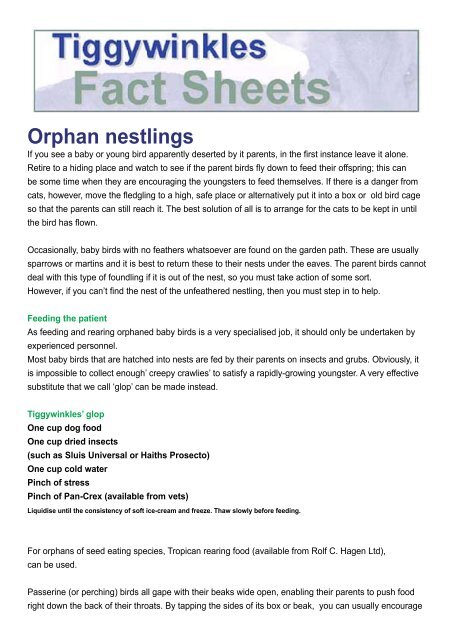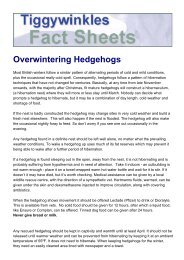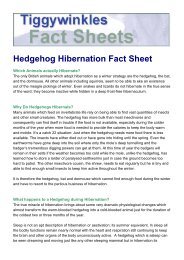Orphan nestlings - Tiggywinkles
Orphan nestlings - Tiggywinkles
Orphan nestlings - Tiggywinkles
Create successful ePaper yourself
Turn your PDF publications into a flip-book with our unique Google optimized e-Paper software.
<strong>Orphan</strong> <strong>nestlings</strong><br />
If you see a baby or young bird apparently deserted by it parents, in the first instance leave it alone.<br />
Retire to a hiding place and watch to see if the parent birds fly down to feed their offspring; this can<br />
be some time when they are encouraging the youngsters to feed themselves. If there is a danger from<br />
cats, however, move the fledgling to a high, safe place or alternatively put it into a box or old bird cage<br />
so that the parents can still reach it. The best solution of all is to arrange for the cats to be kept in until<br />
the bird has flown.<br />
Occasionally, baby birds with no feathers whatsoever are found on the garden path. These are usually<br />
sparrows or martins and it is best to return these to their nests under the eaves. The parent birds cannot<br />
deal with this type of foundling if it is out of the nest, so you must take action of some sort.<br />
However, if you can’t find the nest of the unfeathered nestling, then you must step in to help.<br />
Feeding the patient<br />
As feeding and rearing orphaned baby birds is a very specialised job, it should only be undertaken by<br />
experienced personnel.<br />
Most baby birds that are hatched into nests are fed by their parents on insects and grubs. Obviously, it<br />
is impossible to collect enough’ creepy crawlies’ to satisfy a rapidly-growing youngster. A very effective<br />
substitute that we call ‘glop’ can be made instead.<br />
<strong>Tiggywinkles</strong>’ glop<br />
One cup dog food<br />
One cup dried insects<br />
(such as Sluis Universal or Haiths Prosecto)<br />
One cup cold water<br />
Pinch of stress<br />
Pinch of Pan-Crex (available from vets)<br />
Liquidise until the consistency of soft ice-cream and freeze. Thaw slowly before feeding.<br />
For orphans of seed eating species, Tropican rearing food (available from Rolf C. Hagen Ltd),<br />
can be used.<br />
Passerine (or perching) birds all gape with their beaks wide open, enabling their parents to push food<br />
right down the back of their throats. By tapping the sides of its box or beak, you can usually encourage
a bird to gape, whereupon you can deposit a small amount of the food mixture down the back of the<br />
throat. Do not pick the bird up or feed it with your finger or it will become imprinted. Those little plastic<br />
spatulas provided in cafes to stir tea with, are very useful. When feeding a bird make sure that no food<br />
or moisture enters its glottis; the hole which is situated immediately behind the tongue. Always keep the<br />
bird clean; do not allow food to go onto its feathers - a ‘baby wipe’ will help.<br />
Bird head diagram<br />
Baby birds should be fed at least every 10-15 minutes from dawn to dusk. You will know when a fledgling<br />
has temporarily had enough as it will stop gaping.<br />
Heat<br />
Small unfeathered hatchlings need heat at all times.<br />
They are notoriously difficult to rear - phone us for advice<br />
with any problems. Large birds with feathers need<br />
to be kept in a draught proof box at approximately 60ºF.<br />
Overhead heat lamps with ceramic bulbs are ideal for<br />
baby birds.<br />
Weaning<br />
Birds will probably fly before they are weaned, so do not<br />
release them until you have seen them regularly pick up<br />
seed, in the case of a seed-eater, or clean, white maggots or waxworms, in the case of an insectivore<br />
(both of which should be gradually introduced to the bird).<br />
Species<br />
As with seed-eaters and insectivores, it is important to identify the species of the orphan, as some birds<br />
require specialised feeding.<br />
Owls and Birds of Prey<br />
These need dead mammals or birds in order to survive - a very specialised job. The food may have<br />
to be cut up into bite-sized pieces for youngsters. All birds of prey must bring up pellets of indigestible<br />
bones and fur.<br />
Pigeons and Doves<br />
Baby pigeons and doves are different from all other British birds in that they are reared on a milky<br />
substance produced in their parents’ throats. To rear them we use Tropican for very tiny pigeon, and<br />
ground corn mixed with water for larger birds. This mixture is then syringed straight into the<br />
pigeons crop. This should only be attempted by very experienced bird handlers.<br />
Waterfowl<br />
These can pick up their food as soon as they are hatched. Offer them Chick Crumbs<br />
(stocked by most pet shops) and a small bowl of drinking water.
Do not let them bathe as the feathers are not yet waterproof and the birds can easily chill.<br />
Moorhens are especially difficult - please phone for advice.<br />
Game and Other Precocial Birds<br />
These will peck away at seed and chick crumbs mixed with some insects. A small branch of unsprayed<br />
greenfly, off the roses, will probably tempt them. Once again, only a small dish of water.<br />
Crows, Magpies and Seagulls<br />
These will eat copious quantities of puppy food or other meat products. Be very careful not to imprint<br />
these very intelligent birds. Keep human contact to a minimum, and when you feed them, use a spatula<br />
or tongue depresser without picking the bird up.<br />
For more information read: Practical Wildlife Care, by Les Stocker<br />
Don’ts to bear in mind when fostering baby birds:<br />
* Never try to give a drink of anything as the bird will probably drown.<br />
* Never offer a bird bread and milk, or alcohol.<br />
* Earthworms are sometimes toxic, so don’t feed birds on worms.<br />
* Keep the handling of the bird to a minimum as it will easily become imprinted (tame).




